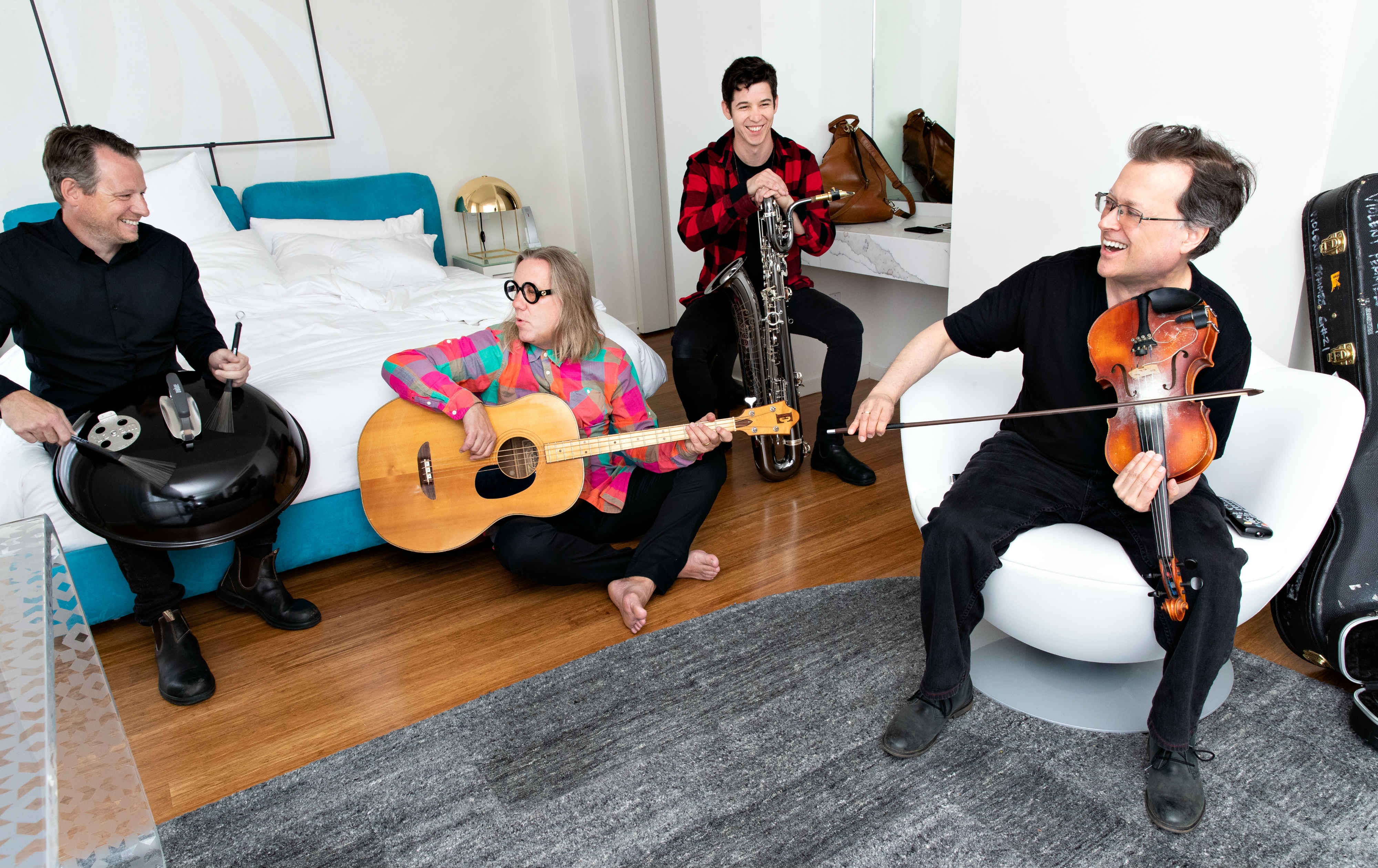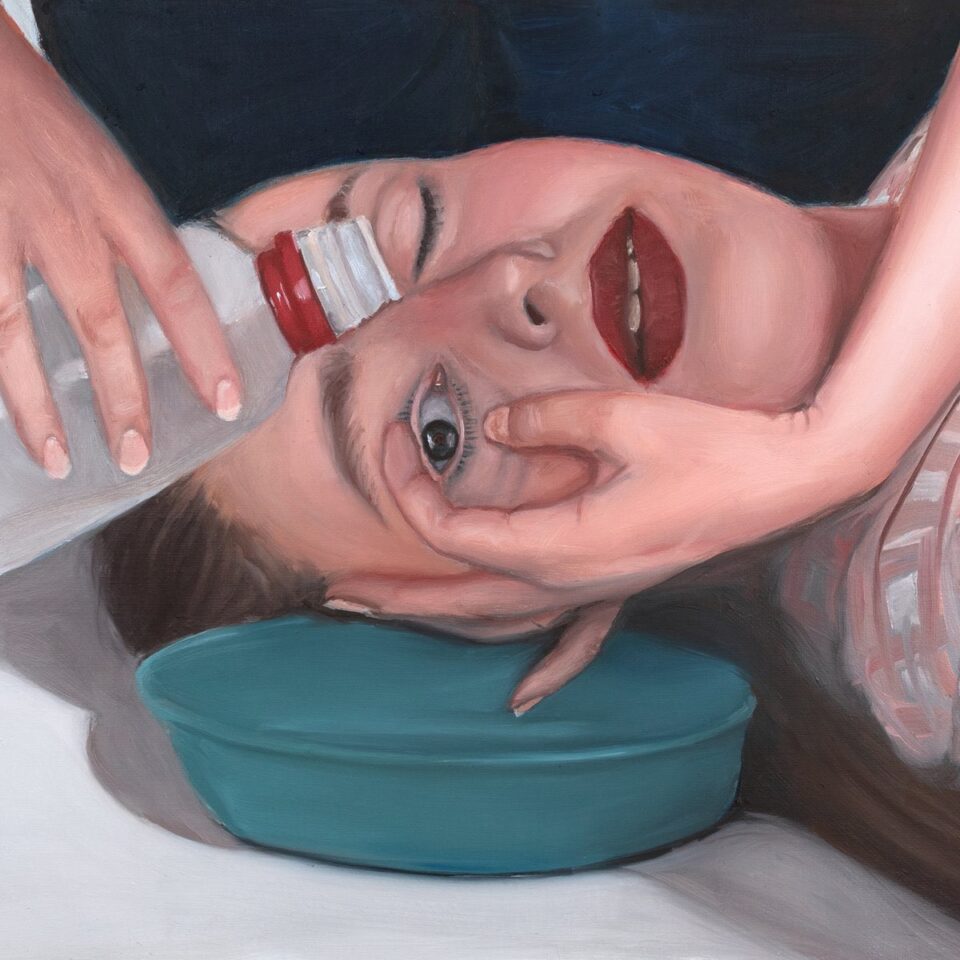Driving through the Midwest while on tour with Violent Femmes, co-founder, writer, and mouthpiece Gordon Gano talks confidentially about his longtime ensemble, almost as if with age comes comfort and freedom.
Co-created with Brian Ritchie in 1980 with several breaks to mark its humanity, the Violent Femmes and Gano have forever been the sound of rhythmic freak folk venturing into other territories and outré genres. As they get older, they get noisier, more open and less constrained with albums such as 2016’s We Can Do Anything and their just-released Hotel Last Resort, which contains some of the band’s boldest songs committed to record.
As the extraneous noise of travel whirrs behind him, Gano talked life, religion, existentialism, and family with rare candor.
When you and Brian decided to revive Violent Femmes in 2013, was there a stipulation that you would create new music on a fairly regular basis?
No, there were no stipulations of any kind, whatsoever.
So then making new music came organically.
Correct.
What, then, can you say about the changing dynamics of your songwriting and how that works within the Violent Femmes?
For me personally, I keep playing more music—more of a variety of music and different instruments—than ever before. I play bluegrass now, and more improvised music. Completely free, with no form or structure whatsoever. I am also now playing violin and banjo. And I’m incorporating that into Violent Femmes’ contexts.
Am I missing that on Last Resort Hotel? I don’t recall hearing strings and fiddles.
Well, things are in the moment. When we recorded the new album, I didn’t play any banjo or violin. Brian asked, but—as we recorded the album so fast—I simply forgot to bring them to the studio. Not here today. Note to self: have your violin and banjo with you at all times. Other than that, it’s much more of the same as to how we approach our albums, rather than anything different. That part hasn’t changed from the very beginning of Violent Femmes.
“I don’t have that feeling of wanting to jump up and down, and say, ‘Look at me. Look at me.’ In my twenties, I’m sure I had that energy.”
Do you mind if I ask why you don’t record solo like you used to? You still do singles and one-offs for compilations, but in the past you did albums as The Mercy Seat, then your solo album, Hitting the Ground, and a full record as Gordon Gano and the Ryans. Why stop when it sounds as if your interests are only getting bigger and wider?
Hitting the Ground is a real personal favorite of mine. I love the people and the songs and the lyrics on it. Same with the stuff I did with the Ryan Brothers. I guess it’s just that I haven’t had the drive or the time… I don’t have that feeling of wanting to jump up and down, and say, ‘Look at me. Look at me.’ In my twenties, I’m sure I had that energy. A whole lot of that. I do think, however, that it will happen again someday. I did do an acoustic solo show though, not so long ago, in Australia as part of Brian Richie’s curated festival with MONA, the museum where he works and does this amazing annual festival in Tasmania.
Religion has been a big part of your life, as a devout Baptist with a father in the ministry. You reference the book of Genesis on the new album with “Adam Was a Man,” and there seems to be something obliquely devotional about “Everlasting You,” a love song to someone Higher. Where do you stand in terms of your faith, at present, and how it has evolved through what you do as an artist?
I’m glad to hear that you found that on “Everlasting You.” I think most people think of it as a romantic song. Romance was never in my mind when I wrote that. But I do realize that it is a reasonable way of looking at it.
And I like things that have more than one way of looking at something, interpreting something. Certainly this song has that, and that was in my mind when writing. Now, normally I pull out when I hear the word “religion.” I start removing myself from any conversation without any thought or serious feeling. It’s not you. Or anybody. I hope that doesn’t sound judgmental or weird. It’s just that it sets up the conversation to be something else, commenting on something. Even by saying that, it is another thing. It makes sense and it makes no sense. You can also bring it to a place where there is almost nothing to say or converse about, which is a nice place to be. That doesn’t help in interviews, I know. Hopefully, things that are spiritual or religious have become so incorporated in my life, that there is no special designation for them.
I get where you’re coming from. Often when religion comes up, there’s a sense that you have to defend yourself. Looking at what you do now and what your family did in your youth—your dad as a minister, your mom a theater teacher—who do you see more of in yourself?
That’s difficult, only in that I feel both of them very strongly. I can see a lot how both influence me. I would, though, have to say—my mom is still alive at ninety-two, and I’m quite sure she won’t read this or what comes of this—that it’s my father. That’s an intuitive feeling I have. I’ll always wonder, and I’ll never know, if there is some gender aspect to it. I would think there could be. There’s just something I feel, a connection. When you get to a certain age—and I hear this more from women who feel as if they are turning into their moms—there is an inclination toward becoming more like a parent. Unless you resist that. Or embrace that. I’m becoming more like him, though.
Why choose to redo “I’m Nothing”? The original came out in 1994, but this time around there is an existentialism to the proceedings that didn’t seem present in the past. I know it had something to do with skater Stefan Janoski.
Stefan was a huge fan. He has a classic shoe with Nike, and thought it would be cool to do something with us regarding that. They were open to ideas. He’s a bright guy—an artist, a writer, so much positive energy—and knows our material so well. I think he liked “I’m Nothing” in particular, as it is about refusing to accept any labels. He talks about that song in ways I had never thought of. I always thought of it as black-humored, originally. It was written as an assignment for a movie and a character that never got released, and was just held onto for a Violent Femmes project. Now, here he was, designing a Violent Femmes shoe—and he is a musician—so I wanted to bring him in. I began to write additional lines for the song, something more personally connected to what is going on now, to who I am now, and maybe even [incorporating] his views and his enthusiasm for the song. There’s more personal feeling from me; so it’s not just a re-record, but a re-creation. Still, I didn’t think it would be on the new album.
“We don’t have political songs, and I don’t think of my songwriting as having those views. I don’t even think that saying that everything is political is accurate.”
Why not?
Because we had never done that before. Then Brian reminded me that in the folk tradition, repeating songs over and over again on albums occurs often. That really doesn’t exist in pop culture.
Jazz, too.
And you mention existentialism—I just happened to open a book on Sartre’s writings and someone’s commentaries on his essence: “In our nothingness is our freedom.” That is what the song is about. I wasn’t trying to get that thought in the song, but there it is.
It’s not that I don’t think of Violent Femmes as political or politicized—perhaps more subtly socio-conscious at times. You wrote “Paris to Sleep,” which includes a sense of terrorism in its lyrics. But you end the album with “God Bless America.” Both feel very political. Why now?
Yeah, you’re right. We don’t have political songs, and I don’t think of my songwriting as having those views. I don’t even think that saying that everything is political is accurate. This time, though, yes, both of those songs relate to the attacks of 9/11. I wrote “Paris” right after the attacks. There are songs that are flights of fancy or imaginative, then there are those of personally held thought, and some that blend the two. Most of “Paris” is exactly what I was thinking. And “God Bless America”…I just started playing around with that way of doing it after 9/11, with a mournful feeling for the country. Aside from the horror everyone felt, I personally knew somebody who was killed there. When we brought this into the studio, I thought I would end the song after two go-arounds, but Brian really wanted to take it further and into something freer, and more open. What’s the point and purpose of that? Brian said, ‘This is American music at its finest and most important.’” FL







